Table of Contents
- Understanding Medical Marijuana Programs
- How to Get a Medical Marijuana Card in Minnesota
- Obtaining a Medical Marijuana Card in New Hampshire
- New Mexico Medical Cannabis Card Process
- Getting a Medical Cannabis Card in Rhode Island
- South Dakota Medical Marijuana Program
- Preparing for Your Medical Evaluation
- Next Steps After Receiving Your Card
How to Obtain a Medical Marijuana Card in Various States
Navigating the process of obtaining a medical marijuana card varies significantly from state to state. Each state maintains its own qualifying conditions, application procedures, and renewal requirements. This comprehensive guide walks you through the process in Minnesota, New Hampshire, New Mexico, Rhode Island, and South Dakota to help patients access the medication they need.
Understanding Medical Marijuana Programs
Medical marijuana programs provide patients with qualifying conditions legal access to cannabis for therapeutic use. While the federal government still classifies marijuana as a Schedule I controlled substance, individual states have implemented their own medical cannabis frameworks. For a broader overview, our state-by-state guide covers additional regions.
How to Get a Medical Marijuana Card in Minnesota
Minnesota's medical cannabis program has been operational since 2014, with gradual expansions to qualifying conditions over time.
Qualifying Conditions in Minnesota
To get a medical cannabis card in Minnesota, patients must have one of these qualifying conditions:
- Cancer associated with severe/chronic pain, nausea, or cachexia
- Glaucoma
- HIV/AIDS
- Tourette syndrome
- ALS (Amyotrophic Lateral Sclerosis)
- Seizures/Epilepsy
- Severe and persistent muscle spasms
- Inflammatory bowel disease
- Terminal illness
- Intractable pain
- Post-Traumatic Stress Disorder (PTSD)
- Autism Spectrum Disorder
- Obstructive Sleep Apnea
- Chronic pain
Application Process in Minnesota
To get a medical marijuana card in Minnesota:
- Register with the Minnesota Department of Health's Office of Medical Cannabis
- Schedule an appointment with a registered healthcare practitioner
- Have your healthcare provider certify your qualifying condition
- Complete the online application and pay the $200 fee (reduced to $50 for those on certain assistance programs)
- Receive your approval email and visit a Cannabis Patient Center
The Minnesota program does not allow smoking of dried flower, focusing instead on oils, tinctures, and other non-smokable forms. For patients managing their medication, precision dispensing tools and filling equipment can help maintain consistent dosing at home.
Obtaining a Medical Marijuana Card in New Hampshire
New Hampshire's Therapeutic Cannabis Program requires specific documentation and physician certification.
New Hampshire Qualifying Conditions
Qualifying conditions for how to get a medical marijuana card in NH include:
- Cancer
- Glaucoma
- HIV/AIDS
- Hepatitis C
- ALS
- Muscular dystrophy
- Crohn's disease
- Multiple sclerosis
- Chronic pancreatitis
- Spinal cord injury or disease
- Traumatic brain injury
- Epilepsy
- Lupus
- Parkinson's disease
- Alzheimer's disease
- Ulcerative colitis
- Ehlers-Danlos syndrome
- PTSD
- Moderate to severe chronic pain
New Hampshire Application Steps
The process for obtaining a medical marijuana card in NH includes:
- Obtain certification from a qualified medical provider
- Complete the application form
- Submit proof of NH residency
- Pay the $50 application fee
- Submit a passport photo
- Select a dispensary (Alternative Treatment Center)
New Hampshire patients should allow 2-3 weeks for application processing. More details on the NH process can be found in our comprehensive state guide.
New Mexico Medical Cannabis Card Process
New Mexico has one of the longer-running medical cannabis programs, established in 2007.
New Mexico Qualifying Conditions
New Mexico has an extensive list of qualifying conditions, including:
- Cancer
- Glaucoma
- Multiple sclerosis
- Damage to the nervous tissue of the spinal cord
- Epilepsy
- HIV/AIDS
- Painful peripheral neuropathy
- Intractable nausea/vomiting
- Severe anorexia/cachexia
- Hepatitis C
- Crohn's disease
- PTSD
- ALS
- Huntington's disease
- Parkinson's disease
- Ulcerative colitis
- Alzheimer's disease
- Autism Spectrum Disorder
- Opioid Use Disorder
How to Apply in New Mexico
To get a medical marijuana card in NM:
- Obtain certification from a qualified healthcare provider
- Complete the application through the NM Department of Health
- Submit proof of New Mexico residency
- There is no application fee in New Mexico
- Cards are valid for three years before renewal is required
Getting a Medical Cannabis Card in Rhode Island
Rhode Island's medical marijuana program is formally known as the Medical Marijuana Program (MMP).
Rhode Island Qualifying Conditions
To get a medical cannabis card in Rhode Island, patients must have:
- Cancer
- Glaucoma
- HIV/AIDS
- Hepatitis C
- Chronic or debilitating disease or medical condition that causes cachexia
- Severe, debilitating chronic pain
- Severe nausea
- Seizures
- Severe and persistent muscle spasms
- Agitation related to Alzheimer's disease
- PTSD
- Autism Spectrum Disorder
Rhode Island Application Process
The process to get a medical marijuana card in RI includes:
- Obtain a written certification from a licensed physician
- Complete the patient application form
- Submit a passport-style photograph
- Provide proof of Rhode Island residency
- Pay the $50 application fee (waived for some low-income applicants)
- Designate a caregiver or authorized purchaser if needed
Rhode Island also allows patients to grow their own medical cannabis with proper registration. You can learn more about similar programs in neighboring states in our regional comparison guide.
South Dakota Medical Marijuana Program
South Dakota's medical cannabis program is relatively new, having been approved by voters in 2020.
South Dakota Qualifying Conditions
South Dakota takes a different approach, allowing physicians to recommend medical cannabis for any condition they feel would benefit, including:
- Cachexia or wasting syndrome
- Severe or chronic pain
- Severe nausea
- Seizures
- Severe and persistent muscle spasms
- Any other medical condition or treatment approved by the Department of Health
South Dakota Application Steps
To get a medical marijuana card in South Dakota:
- Obtain a written certification from a physician with whom you have an established relationship
- Apply through the South Dakota Department of Health
- Submit proof of residency and identity
- Pay the $75 application fee
- Receive your card, typically within 2-3 weeks
Preparing for Your Medical Evaluation
Regardless of state, preparing for your medical evaluation is crucial:
- Gather all relevant medical records documenting your qualifying condition
- Prepare a list of current medications
- Document how your condition affects daily activities
- Research your state's specific program requirements
- Prepare questions about cannabis as a treatment option
Some states allow telemedicine evaluations, while others require in-person visits. Check your state's requirements before scheduling an appointment. For more information on evaluation preparation, see our Illinois guide, which contains generally applicable advice.
Next Steps After Receiving Your Card
Once you've successfully obtained your medical marijuana card, you'll need to understand how to use it effectively. This includes learning about available products, dosing considerations, and legal limitations that may still apply. Many states require patients to designate a specific dispensary, while others allow visits to any licensed facility within the state.
Remember that even with a valid medical marijuana card, there are still important considerations around employment, housing, and travel between states. Federal prohibition means that crossing state lines with medical cannabis remains illegal, even between two states with legal programs.
As medical cannabis programs continue to evolve nationwide, staying informed about your state's specific regulations ensures you can access the medicine you need while remaining compliant with local laws.











Leave a comment
All comments are moderated before being published.
This site is protected by hCaptcha and the hCaptcha Privacy Policy and Terms of Service apply.